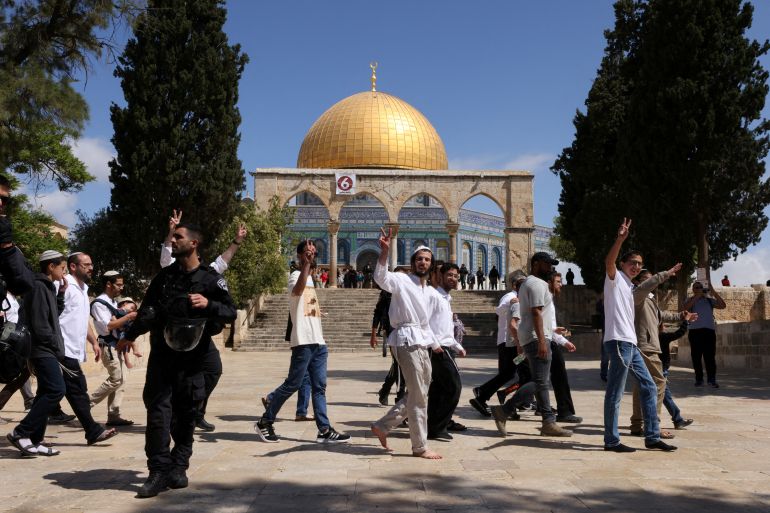Israeli court questions ban on Jewish prayer at Al-Aqsa compound
Court overturns a police order barring three Jews from holy site after they prayed there in violation of the status quo.

A lower Israeli court has overturned a police order barring three Jews from the Al-Aqsa Mosque compound after they prayed there in violation of understandings with Muslim authorities, questioning the legal basis of such enforcement.
The Al-Aqsa Mosque compound, located in occupied East Jerusalem’s Old City and housing Islam’s third-holiest site, is referred to as al-Haram al-Sharif, or the Noble Sanctuary, by Muslims. According to an agreement in place since 1967, non-Muslims are allowed onto the site during visiting hours, but they are barred from praying there.
Keep reading
list of 4 itemsPalestinian teen killed in Israeli raid in occupied West Bank
US urges probe, accountability for Shireen Abu Akleh’s killing
US removes ultranationalist Israeli group from ‘terror’ list
Jews believe the 35-acre compound is where the Biblical Jewish temples once stood.
Israel allows Jews to visit on condition they refrain from religious rites. But the increasing number of such visits, including over the Muslim fasting month of Ramadan that coincided this year with the Jewish Passover festival, has stoked the fears of Palestinians, who see this as Israeli attempts to change the holy site’s sensitive status quo.
‘A grave assault’
Palestinian Authority President Mahmoud Abbas issued a statement calling Sunday’s ruling “a grave assault against the historic status quo … and a flagrant challenge to international law”.
The Jerusalem Magistrate’s Court ruled in favour of three appellants who had been banned from the Old City for 15 days for prostrating themselves and intoning a core Jewish prayer at the compound. The ruling quoted police as saying those actions disrupted its officers’ duties and threatened public order.
Removing the ban, Judge Zion Saharai said that while he had no intention of interfering in law enforcement at the site, “the appellants’ conduct does not raise worry of harm befalling national security, public safety or individual security”.
Police had no comment. Eran Schwarz, a lawyer whose firm represented the appellants, said he expected police to contest the ruling. Magistrate’s courts can be overturned by district courts, with Israel’s Supreme Court a final course of appeal.
The ruling came a week before far-right Israelis are due to hold an annual flag march through the Old City, marking its capture by Israel in the 1967 Middle East war. Israel later annexed occupied East Jerusalem, a move not recognised by most of the international community. The event is resented by Palestinians, who want the Old City and other parts of occupied East Jerusalem as the capital of their hoped-for future state.
Hamas, a Palestinian group that fought a Gaza war with Israel last year that was partly stoked by tensions in occupied East Jerusalem, described the flag march’s planned route through a Muslim quarter of the Old City as “adding fuel to the fire”.
“I warn the enemy against carrying out such crimes,” Hamas chief Ismail Haniyeh said in a televised address.
Jordan, a United States-backed Israeli security partner that serves as custodian of Al-Aqsa, has also voiced concern about the Jewish visits to the compound.